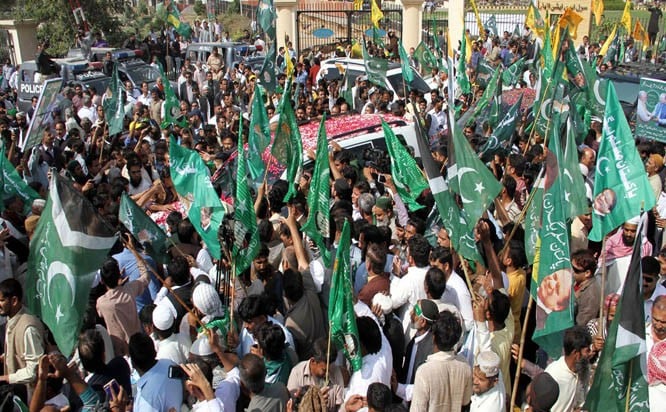
Political parties see ‘electables’ as a safe bet in the upcoming general elections. Will they deliver?

Mainstream political parties are in the battle to rope in electables for the forthcoming general elections. This race to have big guns on board raises questions about the circumstances which help political figures to be greatly influential in their constituencies.
Political parties ignore their ideology to win more electoral seats. Certainly, these electables can be found in every province, having firm grip on their electorates.
"The culture of electables developed in District Board Elections right after partition," says Iftikhar Ahmed, senior analyst while talking to TNS. "The roots of electables were further strengthened during local body election held in 1962. Nevertheless, the emergence of political parties and charismatic leadership in the 1970s abolished the very concept of an electable. Since 1985, the wobbly political circumstances have facilitated these individuals to regain and sustain their non-partisan strength at the local level."
The phenomenon of electables is not confined to our region only, we can spot it at the international level as well. "People in strong democratic cultures of the UK and US establish themselves as electables. However, most of them perform their role while being associated with political institutions," says senior analyst Suhail Warraich.
In Pakistan, political dynasties have been an important component of our fragile democratic system. Dozens of constituencies in Pakistan are the stronghold of political families. Most of the current lot of electables belongs to influential families that get their members elected to different positions in all previous elections.
For instance, Saifullahs, Bilours, Walis, Mufti Mehmoods in KP; Magsis, Bugtis, Marris, Sanjaranis in Balochistan; Bhuttos, Gabols, Sherazis, Jatois in Sindh; and Legharis, Khosas, Gillanis, Khars, Chatthas and Dastagirs, Cheemas in Punjab.
The influence of Pirs cannot be ignored: Sarwari Jamaat led by Makhdooms of Hala, Ghousia Jamaat led by Shah Mahmood Qureshi, Pir of Ranipur in Khairpur Mir, Hurs led by Pir Pagaro, and Sajjada Nasheen of Darbar-e-alia Hazrat Shah Jewna have always had a share in the national and local politics. Sectarian elements also play a part in empowering mullas as electables, like in Jhang.
"In fact, the establishment, religious leaders and leftists always undermined democracy and democratic institutions so that individuals remain in a position to influence political parties," says Wajahat Masood, senior analyst. "These forces constantly stand against the notion of inclusive democracy because frail democracy gives them a vacuum to flourish and retain the masses under their command. Sectarianism, ethnicity, caste system, weak state institutions, local power centres like police stations, and patwaris, etc., enable them to keep the society stagnant."
Primarily, rural areas have been the strongholds of electables. "However, since 1985 the business community, especially traders and real estate actors, have surfaced on the political scene," says Iftikhar Ahmed.
Suhail Warraich says, "Political parties do not have adequate strength at the grossroots to establish durable political hubs."
Political parties are looking for maximum numbers of electables under their banner. "I don’t consider that electables have any role in the approaching general election and the elections to come," believes Tahir Mehdi, who works for Punjab Lok Sujag.
Read also: Once a worker
"The electables exercised influence till 2002. Since then the margin for a party candidate is increasing because political parties are now gaining strength. We can witness that the margin of winning horses as independents has decreased, albeit the candidates are getting stronger with the help of party votes. The chances are that the overriding concept of electables may break in the upcoming elections," he says.
"Even if these electables become weaker as independent candidates, they will still persist in the power corridors," Iftikhar Ahmed says.